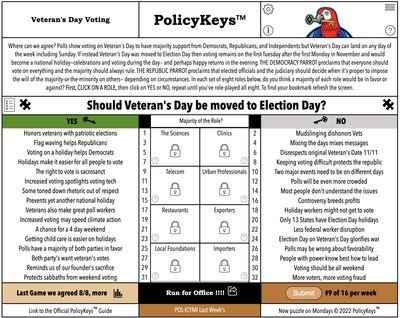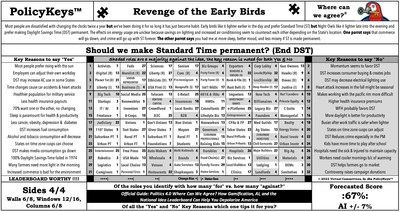DENNIS, Mass., Nov. 14, 2022 /PRNewswire/ — Today launches the first weekly public policy puzzle which includes a nonpartisan scoring system. “PolicyKeys™ Where Can We Agree?” consists of sixteen role-playing games per week, where you match political wits with the ideologically balanced puzzle editors who are assisted by POLI the AI, an anagram for Policy Omnibus Leadership Initiative Artificial Intelligence. The goal is to eventually score and rank all public policy solutions on a National Idea Leaderboard. Think of the PolicyKeys™ Leaderboard as the offspring of the sports page and a saucy menu. The game can be played for free at PolicyKeys.com, new puzzles on Mondays at 6 am eastern.
The inaugural puzzle is “Should We Move Veteran’s Day to Election Day?” Each game is a set of eight rivals from opposite sides of the game board, in a tip of a stove-pipe hat to Lincoln’s cabinet. If you think every political argument is just left v right, you won’t get very good scores. Life isn’t left or right, and neither are the best PolicyKeys™ players.
The PolicyKeys™ mascot is POLI the AI parrot. Political parrots say the same thing over and over again and don’t really understand what the heck they’re squawking about. POLI the AI has a key in its beak, it represents the key point each political parrot doesn’t want you to know because it’s the one that ruins their argument.
Besides being a game to learn about public policy, ideological balance, and each other, PolicyKeys™ curates the National Idea Leaderboard, which is made up of the solutions that have predicted support from each of the four sides of the politically balanced table. The AI is based on the following ground truth, says Jon Denn, the creator of PolicyKeys™, “There’s a time to save and a time to spend, a time for freedom and a time for laws, where can we agree? This sets up the math that powers the AI.”
Denn continues, “Everyone has an initial bias when looking at a new solution for the first time, Abundance v Thrift, and Commerce v Governance, here’s the thing—each condition is correct roughly 25% of the time. So, while political parrots are just cheerleaders for their team, PolicyKeys™ scores and ranks solutions—someone has to.”
This new Political DNA, ACGT, breaks the gameboard down into four base pairs or sides of the table, AG (Large Governments and NGOs), AC (Tech and New Businesses), TG (Local Governments and Consumers), and TC (Established Supply Chains and Jobs), then into 128 roles overall sorted with a bias for change or status quo. Most roles on the board seem to have a clear and obvious opinion about any particular solution but what’s interesting is when players realize that many of the roles they self-identify with have conflicting views.
That’s an ah-ah moment, humans are politically conflicted, parrots not so much. These personal conflicts show that no one is as left or as right as they might think. So, being a political parrot doesn’t honor the uniqueness of individuals, and it’s certainly no way to keep and attract an interesting flock of friends. It also makes it difficult to keep political peace in the family nest.
If you’d like to collaborate in helping to politically depolarize the country and have a more friendly holiday meal with that crazy relative, you might give PolicyKeys™ a play. Are you a wonk or a parrot? Who knows, maybe you should “Run for Office.” PolicyKeys™ seeks to partner with organizations for oversight of the National Idea Leaderboard.
Contact:
Jon Denn, (860) 930-0264, 348072@email4pr.com
SOURCE PolicyKeys



